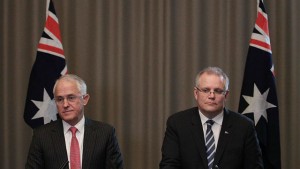Home » Commentary » Opinion » The impossible job of a modern-day treasurer
· Canberra Times
 Being Treasurer is never easy. If politics is the art of the possible, the Treasurer is the one supplying the paint. Do well and the Prime Minister gets all the credit for holding the brush, while the Treasurer is the one everyone blames if the picture is incomplete — or ugly.
Being Treasurer is never easy. If politics is the art of the possible, the Treasurer is the one supplying the paint. Do well and the Prime Minister gets all the credit for holding the brush, while the Treasurer is the one everyone blames if the picture is incomplete — or ugly.
For decades, the Treasurer’s office was the place for the ambitious to demonstrate their credentials as potential Prime Ministers: Howard, Keating and Costello (among others) all rose to prominence as Treasurers.
Yet today the position of Treasurer resembles nothing so much as a poisoned chalice. Wayne Swan, once anointed World’s Best Finance Minister, famously failed to get the budget back under control after the poorly designed GFC cash splash. The four surpluses he pledged and failed to deliver were another wrecking ball to the credibility of Gillard’s government.
His successor Joe Hockey — though it’s largely forgotten — was in 2009 the favourite to become the Liberal leader. Hockey’s appointment as Shadow Treasurer, and then Treasurer, was recognition of his prominence and importance to the party. His subsequent failure to deliver a coherent economic agenda, though far from his fault alone, was a key reason for the fall of both Hockey and Tony Abbott in 2015.
Scott Morrison too was seen a political rising star in 2015. His spectacular success in delivering on the Abbott Government’s promise to ‘stop the boats’ led to speculation he was a viable candidate for leadership. Yet the shine has dulled to such an extent that a prominent radio host observed his audience thought Morrison had become a ‘bland, say-nothing Treasurer’.
Morrison’s name rarely comes up now in the roll call of potential leaders if Turnbull joins Australia’s rapidly growing scrap heap of dumped Prime Ministers.
And so we approach yet another budget — 10 years since the last one that delivered a surplus — with expectations so low that passing most of the measures and not inciting Twitter riots will be claimed as a success.
There are a litany of budgetary problems that are now growing mould in the ‘too hard’ basket. Substantive tax reform is no longer on the agenda, while reform of the ailing federation barely made it onto the agenda in the first place. And if the budget returns near balance any time this decade, it will be in spite of parliament (especially the Senate) not because of it.
Gone too is any realistic chance of addressing the challenges of Australia’s ageing population in this term: in fact any sort of welfare reform that reverses the ever-growing cost of pensions or childcare payments won’t get a look in. As for health and education, the fight is about how much more we should spend for little or no extra benefit: a large amount more or a really, really large amount more?
The federal government has committed to action on housing affordability, but in truth has very few levers to pull that can really address this issue. Using superannuation might move the needle slightly in favour of home buyers (at the cost of higher house prices). Any supposed benefits from negative gearing and capital gains tax reform pale in comparison to the massive roadblocks of state taxes and local government planning restrictions.
It is clear that rent seekers, special interests and populists currently have a stranglehold on Australian politics. Any stomach for difficult reform has disappeared under the bounty of a quarter of a century of uninterrupted growth: the only politically acceptable government actions now are those where no-one — except the hated rich — can be worse off.
As a consequence government spending can only ever go up; never down.
Yet the primary job of those in the finance and treasury portfolios is to keep in check the grandiose schemes of various ministers, and hence government spending. This leaves an impossible dilemma – treasurers must either fail, or condemn government to inaction (an option definitely worth trying one day).
Where does this leave the Treasurer and this budget? He will no doubt claim he has made the hard decisions, but this will be as misleading as the revenue forecasts that will likely again predict surplus just after the next election. Meanwhile expenditures will be dissected line by line — not for unsustainable growth or poor targeting, but for any cuts that can be used to rally disaffected groups.
One potential bright spot remains. If Morrison and Turnbull are going to be broken by our intractable budget problems too, they might choose to go down swinging with the hard budget Australia has to have. But as they used to say on Yes Minister that would be ‘courageous’.
Simon Cowan is Research Manager at the Centre for Independent Studies.
The impossible job of a modern-day treasurer